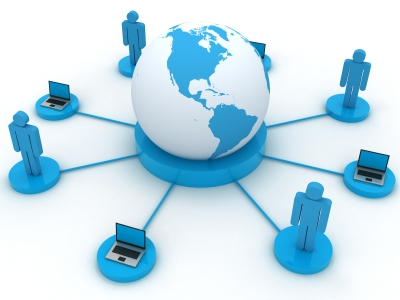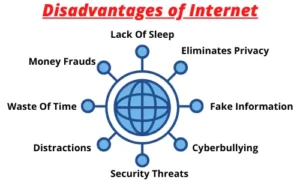
The internet has undoubtedly revolutionized the way we live, work, and communicate. With just a few clicks, we can access an infinite amount of information, connect with people all over the world, and even manage our daily tasks. However, as with any powerful tool, the internet also comes with its fair share of drawbacks. From online privacy concerns to addictive behaviors and cyberbullying, it is essential to weigh both the advantages and disadvantages before diving headfirst into this digital realm. In this article, we will explore the pros and cons of the internet to provide a comprehensive understanding of its impact on our lives.
The Importance of the Internet in Today’s Society
In today’s society, the internet has become an integral part of our daily lives. It has revolutionized the way we communicate, gather information, and even conduct business. The importance of the internet cannot be overstated as it connects people from all corners of the globe and provides access to a wealth of knowledge.
One aspect that highlights the significance of the internet is its ability to bridge geographical boundaries. With just a few clicks, we can connect with someone on the other side of the world through video calls or social media platforms. This instant connectivity promotes cultural exchange, opportunities for collaboration, and unparalleled access to diverse perspectives.
Additionally, the internet serves as an invaluable resource for gathering information. Gone are the days when encyclopedias were our primary source of knowledge; now we have search engines like Google at our fingertips. Whether you need quick answers to trivial questions or in-depth research on complex topics, the internet offers a vast repository of information that is easily accessible. Furthermore, businesses have come to rely heavily on internet technologies for their operations. Online shopping has become ubiquitous, enabling consumers to browse through countless products and services from their own homes while offering businesses a global reach beyond what physical stores could provide previously.

Pros of the Internet:
1. Access to a wealth of information
Access to a wealth of information is one of the greatest advantages that the internet has brought to our lives. With just a few clicks, we can now find answers to almost any question imaginable, learn new skills, and stay updated on the latest news and research. The internet has democratized knowledge and opened up opportunities for self-improvement and personal growth like never before.
However, with the vast amount of information available online comes the challenge of separating fact from fiction. Not all sources are reliable or trustworthy, and it’s easy to fall prey to misinformation or biased viewpoints. Therefore, it’s crucial that we develop critical thinking skills and learn how to verify the credibility of sources before accepting information as truth. Despite this potential drawback, having access to such an abundance of information allows us to explore diverse perspectives and broaden our understanding of various subjects. Moreover, the internet has revolutionized education by making learning more accessible and convenient. Online courses enable individuals from different parts of the world to gain new knowledge in their chosen fields without having to leave their homes or pay exorbitant fees for traditional education. This democratization of education empowers people who may have otherwise been limited by geographical or financial constraints to fulfill their academic aspirations. In today’s interconnected world where continuous learning is key for personal development as well as professional success, access to a wealth of information through the internet has become indispensable.
2. Convenient communication and networking opportunities
Convenient communication and networking opportunities are undoubtedly amongst the biggest advantages of the internet. With just a few clicks, we can connect with people from different parts of the world, bridging distances and facilitating interactions that were once unimaginable. The rise of social media platforms has greatly enhanced these opportunities for communication and networking. We can now easily stay connected with family and friends, update our professional networks, and even connect with like-minded individuals who share our interests or hobbies.
Moreover, the convenience of online communication allows us to collaborate on projects or work remotely without major constraints. This is particularly advantageous in today’s fast-paced society where mobility is highly valued. Digital tools such as video conferencing, instant messaging apps, and productivity software enable us to communicate effectively regardless of our physical location. We no longer need to be physically present in an office or conference room to contribute meaningfully to discussions or make decisions collectively.
3. Online shopping and banking convenience
Online shopping and banking have revolutionized the way we conduct transactions. With just a few clicks, we can order groceries, clothes, or even book flights. Not only does online shopping save time and effort by eliminating the need to physically go to a store, but it also offers a wide variety of options and better prices. Similarly, online banking has made managing finances more convenient than ever before. Instead of waiting in long bank queues or dealing with complex paperwork, we can simply log onto our accounts and handle our transactions from the comfort of our homes.
Furthermore, online shopping and banking allow us to access products and services that may not be available locally. Whether it’s buying rare collectibles or subscribing to international streaming services, the internet has made it possible for us to indulge in experiences beyond geographical boundaries. Additionally, both online shopping and banking offer enhanced security measures such as two-factor authentication and encryption techniques that ensure our personal information is kept safe. These conveniences make it easier for individuals with mobility challenges or busy schedules to fulfill their needs without any hassle.

Cons of the Internet:
1. Privacy and security concerns
Privacy and security concerns have become increasingly prevalent in today’s digital age. With the rise of social media platforms, online shopping, and the sharing of personal information online, it has become easier for our personal data to be accessed by third parties. This raises questions about who has access to our information and how it is being used.
One concern is the potential for identity theft or fraud. As we enter our personal details on various websites or provide them through online transactions, we are putting ourselves at risk of having that information compromised. From credit card numbers to Social Security numbers, these pieces of data can be valuable targets for hackers looking to exploit unsuspecting individuals.
Additionally, there are growing concerns about privacy infringements through targeted advertising and data collection practices by companies. Big tech giants often track our online behavior to gather insights into our preferences and interests. While this can result in personalized recommendations or advertisements catered specifically to us, it also raises concerns about the extent to which our every move is being monitored and analyzed. It falls upon both individuals and organizations to take proactive measures in safeguarding personal information from unauthorized access or misuse. Striking a balance between utilizing technology effectively while protecting one’s privacy remains a critical challenge that must be addressed as we navigate an increasingly connected world.
2. Addiction and time-wasting tendencies
One of the biggest drawbacks of spending excessive time on the internet is its potential to fuel addictive behaviors and time-wasting tendencies. With an overwhelming amount of content available at our fingertips, it’s easy to find ourselves falling into a pattern of mindless scrolling and endless browsing. Whether it’s social media platforms, online gaming, or video streaming services, these digital distractions can quickly become unhealthy obsessions that consume our valuable time.
Addiction to the internet can manifest in various ways – from constantly checking for notifications and updates to feeling anxious or irritable when disconnected from the online world. As we become increasingly dependent on the virtual realm for entertainment, connection, and information, we may begin neglecting other aspects of our lives such as relationships, physical health, and personal growth. The instant gratification provided by the internet further reinforces these addictive patterns as we seek more likes, followers, or virtual rewards. Time-wasting tendencies go hand-in-hand with addiction as we find ourselves getting sucked into an abyss of unproductive activities. Hours pass by unnoticed as we click through article after article or binge-watch entire seasons of a TV show. While occasional leisurely browsing can be harmless and enjoyable in moderation, it becomes problematic when it starts impeding our ability to prioritize important tasks or engage in meaningful experiences offline.
Conclusion: Weighing the advantages and disadvantages
The internet, undoubtedly one of the greatest inventions of our time, has revolutionized the way we live and connect with one another. With just a few clicks, we can access an unimaginable amount of information, communicate instantly with people across the globe, and even indulge in online shopping or entertainment. However, as with any tool that holds such power, the internet also comes with its fair share of drawbacks. From privacy concerns to addiction and misinformation overload, it is crucial to explore both the pros and cons before fully embracing this digital wonderland.
One of the major disadvantages of the internet is the erosion of privacy. In today’s digital age, it has become increasingly difficult to keep personal information secure. Every time we browse the web, use social media platforms, or engage in online transactions, our data is being collected and stored by various entities. This constant surveillance raises concerns about how our personal information is being used and who has access to it.







